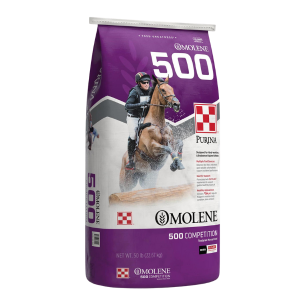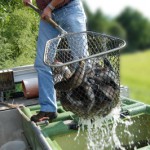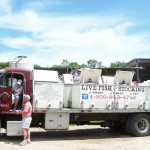Purina Omolene 500 Competition Horse Feed
 Purina Omolene #500 Horse Feed is now formulated with Outlast Gastric Support Supplement.
Purina Omolene #500 Horse Feed is now formulated with Outlast Gastric Support Supplement.
Because only innovations proven to have the highest level of performance and safety earn their place in Purina Omolene horse feeds, you can feed with full confidence. This is an ideal feed whether you need to fuel intense competitive performance or support your horse’s gastric health. Omolene feeds are built to help solve your toughest nutritional challenges.
Omolene #500 for hard-working and endurance equine athletes.
Have questions? Reach out to our friendly staff at any of our local Farmers Co-op locations. Also, be sure to follow us on Facebook for product updates, news and events.
Guaranteed Analysis
Crude Protein (min) 12.00%
Lysine (min) 0.65%
Fat (min) 8.00%
Fiber (max) 9.00%
ADF (max) 12.00%
NDF (max) 27.00%
Calcium (min) 0.80%
Calcium (max) 1.30%
Phosphorus (min) 0.50%
Copper (min) 55 ppm
Selenium (min) 0.60 ppm
Zinc (min) 220 ppm
Vitamin A (min) 3,000 IU/lb
Vitamin E (min) 150 IU/lb
Feeding
FEEDING DIRECTIONS WITH HAY OR PASTURE: Start with the amounts of Omolene 500 COMPETITION given for the weight and lifestyle of the horse. After observing the horse for a period of time, the amount fed may be gradually increased or decreased to obtain the desired body condition and weight.
For feeding directions outside the ranges addressed in these feeding charts, please contact your local Purina retailer or Purina Customer Service
LifestyleWeight of Horse in Pounds.
**Do not feed less than 0.3 lbs per 100 lbs of body weight per day for mature horses (3 lbs per 1000-lb horse). If your horse gains too much weight at that minimum feeding rate, replace Omolene 500 with Purina ENRICH PLUS Ration Balancing Horse Feed.
Feeding rates of Omolene 500 and forage may be adjusted or feed may be top-dressed with Purina Amplify High-Fat Supplement for additional calories. Hard-working horses may also benefit from supplementation with Purina SuperSport Amino Acid Supplement.
Changing To
- Make the feed change gradually over a period of 7 to 10 days.
- Mix the new feed with the old, gradually increasing the amount of the new feed while decreasing an equal amount of the old.
- Changes in the rate of feeding should not exceed 1 pound per day for each horse.
Caution
Important
- Feeding rates will vary with size, age, temperament, health status, forage quality, climate and activity level. Feed at regular times, at least twice daily. Do not feed more than 0.5 lbs/100 lbs of body weight per meal. Do not feed free-choice. Prevent the rapid eating by the horse of any feedstuff.
- Reduce and/or delay feeding a horse which is hot, excited or showing pain, has fever or diarrhea. Consult your veterinarian if any problems arise.
- Always feed a minimum of 1.0 to 1.2 lbs per 100 lbs of body weight of good quality, clean hay or the equivalent in pasture.
- Any feed changes should be made gradually over a period of 7 to 10 days. Changes in the rate of feeding should not exceed 1.0 lb per day for each horse.
- Provide fresh, clean water at all times. Provide your horse with access to salt. Consult with your veterinarian regularly and maintain a routine dental, parasite control and health care program for your horse.



